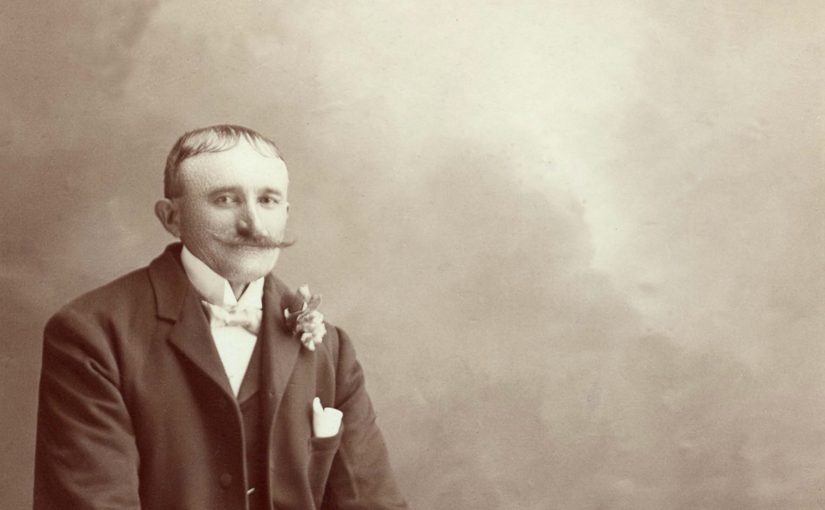Vito (or Vido) Zarko was born in 1865, in or around Dubrovnik. I’m not sure of the location, but Dubrovnik is a good guess. My mother was a natural archivist. She kept bills for hotel rooms, annotated with amenities, other guests, what they had for dinner. I sorted through that material after she died in 2007, filed it carefully away, and shipped it to Scranton, and there it sits doing me not a whit of good. Specifically, and remarkably, she had Vito’s birth certificate, on which his birthplace would have been accurately noted. Sorry, Mom. Someday I’ll figure out a way of reuniting myself with all those files.
I do remember hearing from my father that Vito emigrated when he was rather young, maybe 16 or 17. He had brothers in Argentina and Brazil, so there is a chance that he went first to South America. I also remember hearing that Vito worked a merchant ship for awhile. So perhaps one of his ports-of-call was San Francisco, and perhaps he had friends or relatives in the Bay Area who met him there and convinced him to settle in The Valley of Heart’s Delight, as the Santa Clara Valley was styled before it went over to silicon. However he got there, he found a job as orchard foreman for the Willson family in Sunnyvale. They were famous for the Willson Wonder Walnut, a nut the size of a strong fist. Its shells were sold to Neiman Marcus in Chicago where they were used as packaging for kid gloves. Really. You can’t make that stuff up.
In exchange for his services Vito received a stipend and housing. From what I gather, neither was particularly generous, but he somehow managed to visit family in Croatia at least once, but probably several times, over the next fifteen or so years.
Somewhere in there he also procured land, three separate plots, on which he raised cherries and pears, and maintained a small vineyard. In about 1900 he made one of his trips back home to look for a wife.
That was a major journey at the time. A week by rail to cross the continent, some time in New York while waiting for a steamer to depart. More time in Liverpool to change craft, again in Lisbon or Rome, perhaps more rail and a crossing of the Adriatic from Bari. So, when he traveled, he stayed for weeks.
At some point during his trip in or around 1900 he suffered a serious fracture to his leg, and had to be taken to the Catholic hospital in Dubrovnik. Perhaps that happened early in his stay, or perhaps he didn’t have a way about him with the ladies, or maybe he just didn’t try hard enough, but whatever the reason by the time he was admitted to the hospital his search for a wife had not been successful. The date of departure loomed, he became desperate. He began proposing to the younger of the nuns. They treated it as a joke.
“There’s a girl in the laundry room who talks about going to America all the time. All the time. Maybe she’d be interested.” The sister laughed as she exited the ward. Vito called after, “Send her up, let me talk to this girl!”
Days passed, no one came. He was about to be dismissed from the hospital. Vito found the nun, reminded her about the girl, and insisted that he meet her. She was sent up.
“I have a nice life in California, orchards, I’ll build a house to raise a family in. Would you like to be my wife?”
“Sure,” the girl said, “what do I have to do?”
“I leave in three days. We need to get your documents in order. I’ll buy you a ticket for passage, and send money for expenses when I return to California. Where is your family?”
“The island of Brac.”
“Oh, there won’t be time to meet them. You can get permission from your father?”
“No problem. My sister wants to emigrate, too, and I already have a brother in South America.”
“It’s settled then. I’m Vito Zarko.”
“Irma Berosh.”
“Pleased to meet you.”
“You won’t be sorry, I’m a very good cook.”
Antony was born in 1904 after a stillbirth and a death in infancy. Pete came along in 1907, and George in 1922 when Irma was 42. They left the Willsons in about 1912 and built a small house that was added to as they could afford the cost of construction. The property it sat on was large enough to accommodate two barns, a large garden, a pen for livestock, and a chicken coup. It remains there today, and last I noted, all of the structures have survived – a curious anomaly in the heart of Silicon Valley.
Irma was a good cook, and by all reports Vito absolutely adored her. He died of a heart attack in 1935.
Photo: Vito Zarko in 1910.
